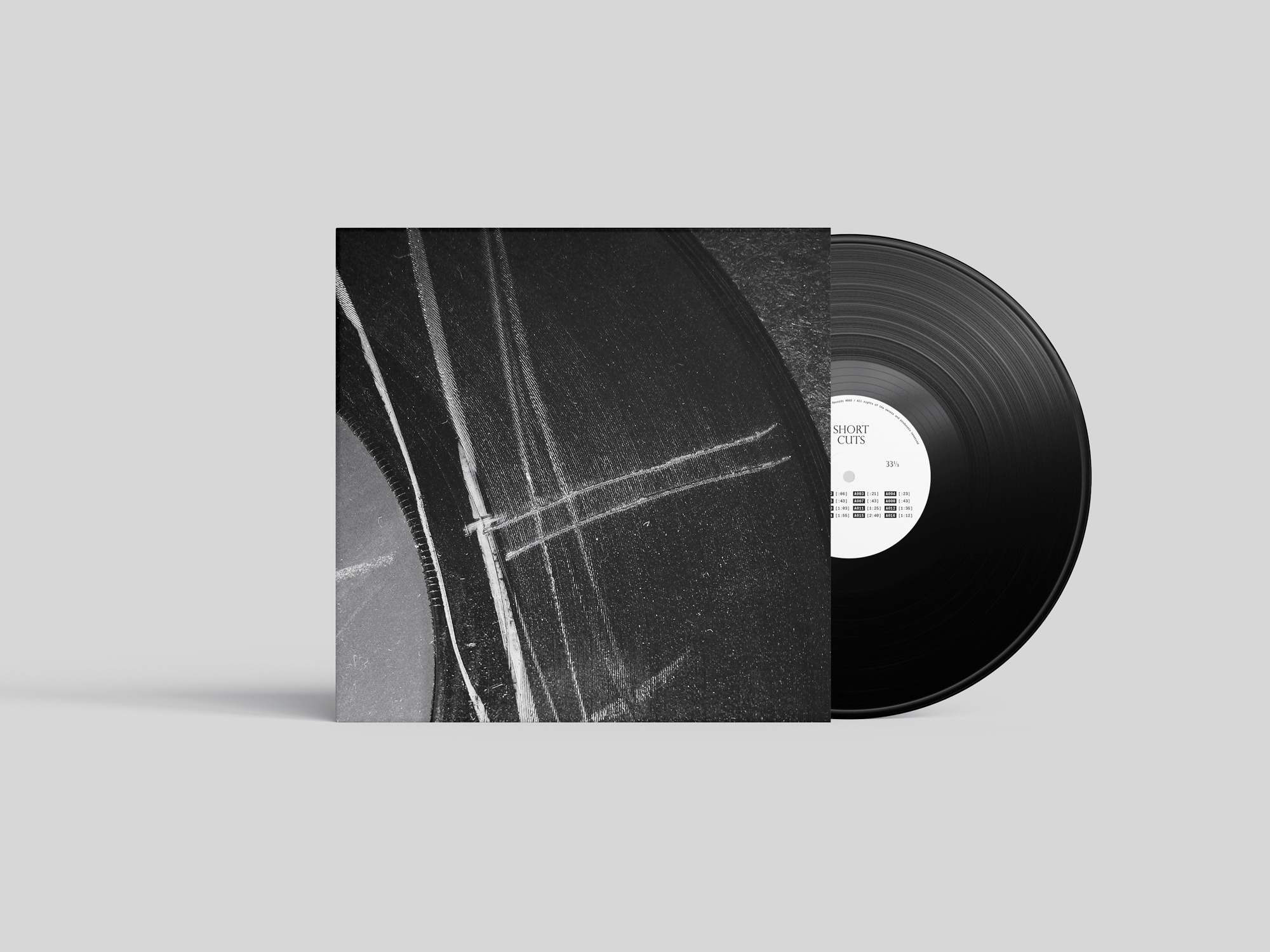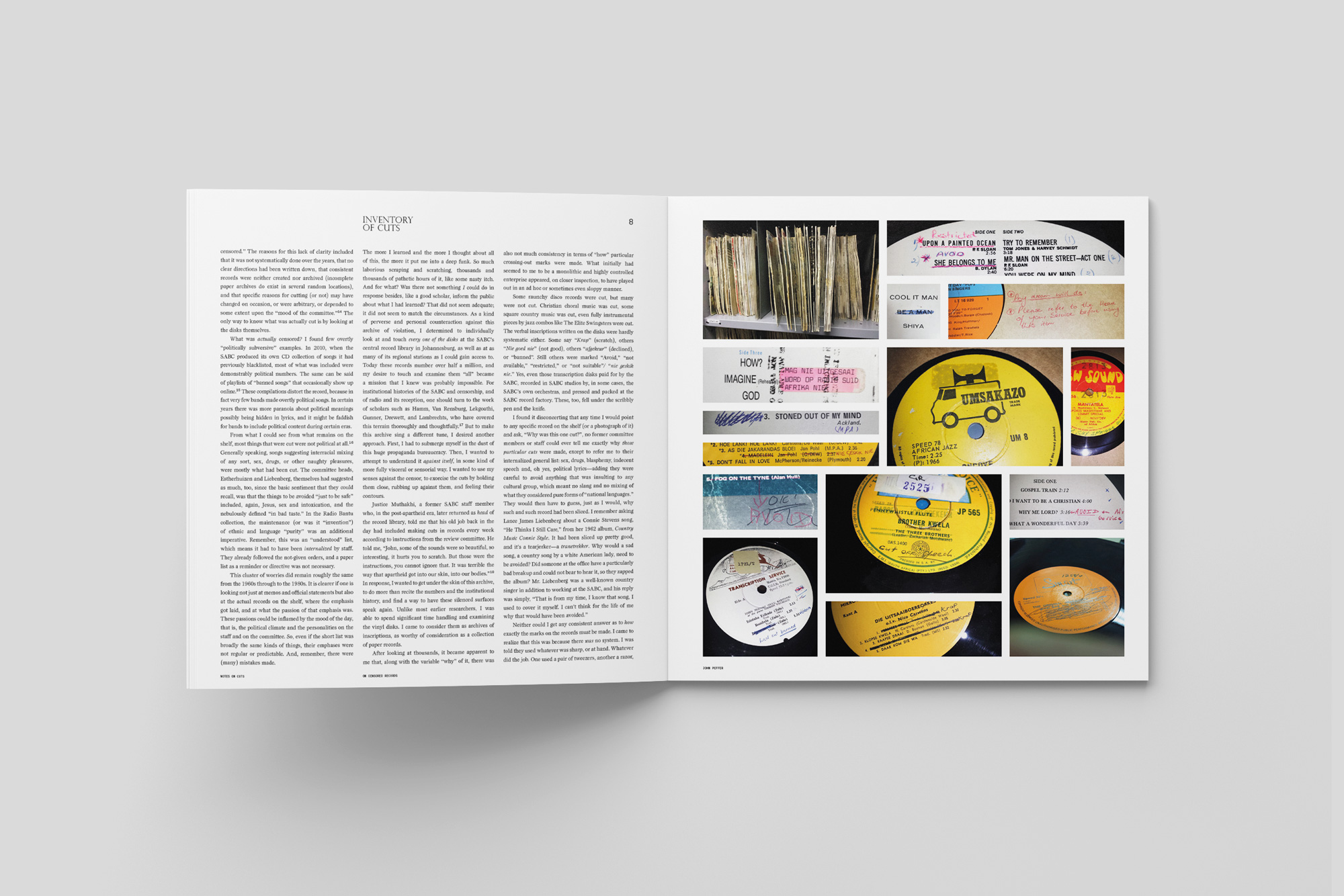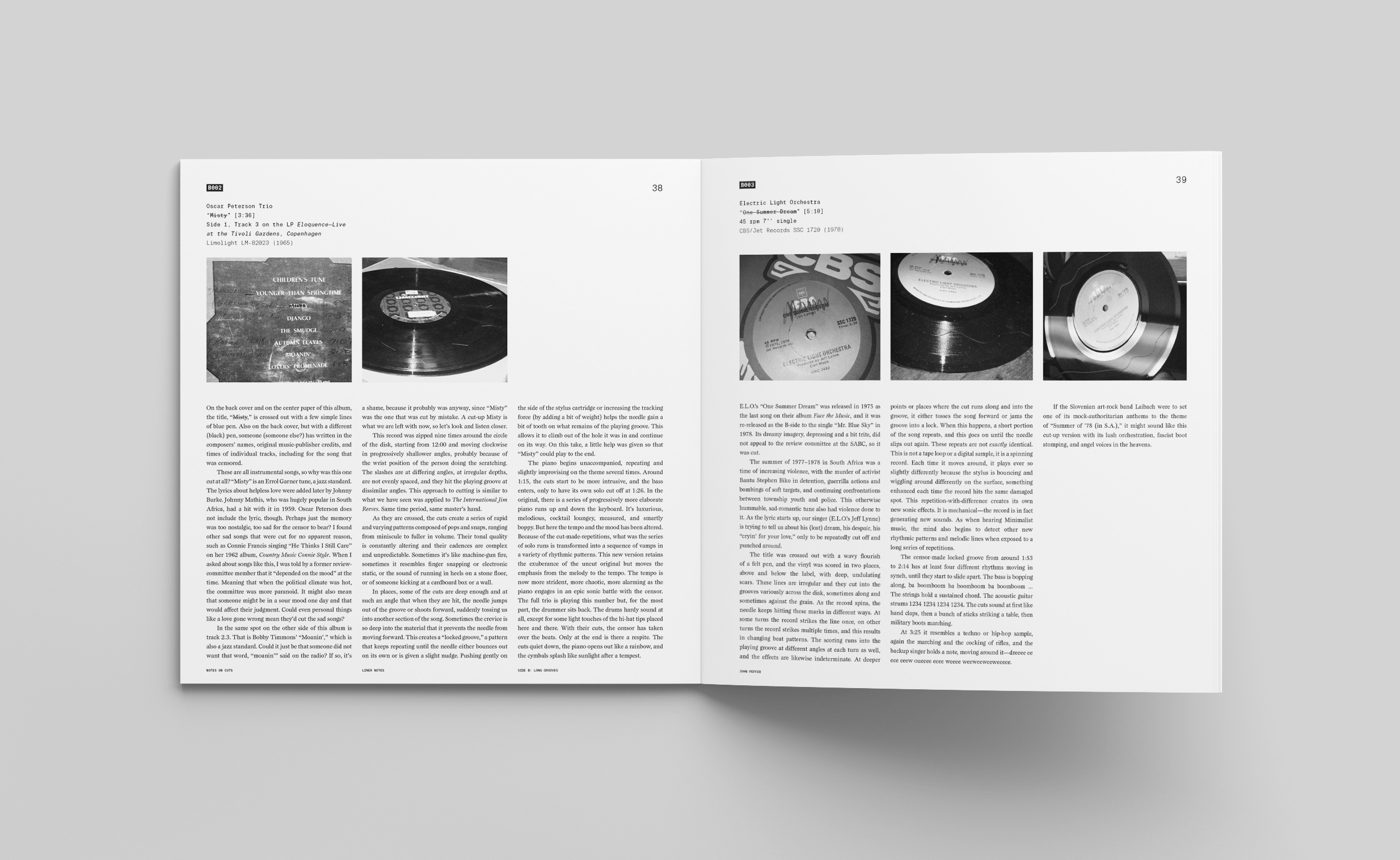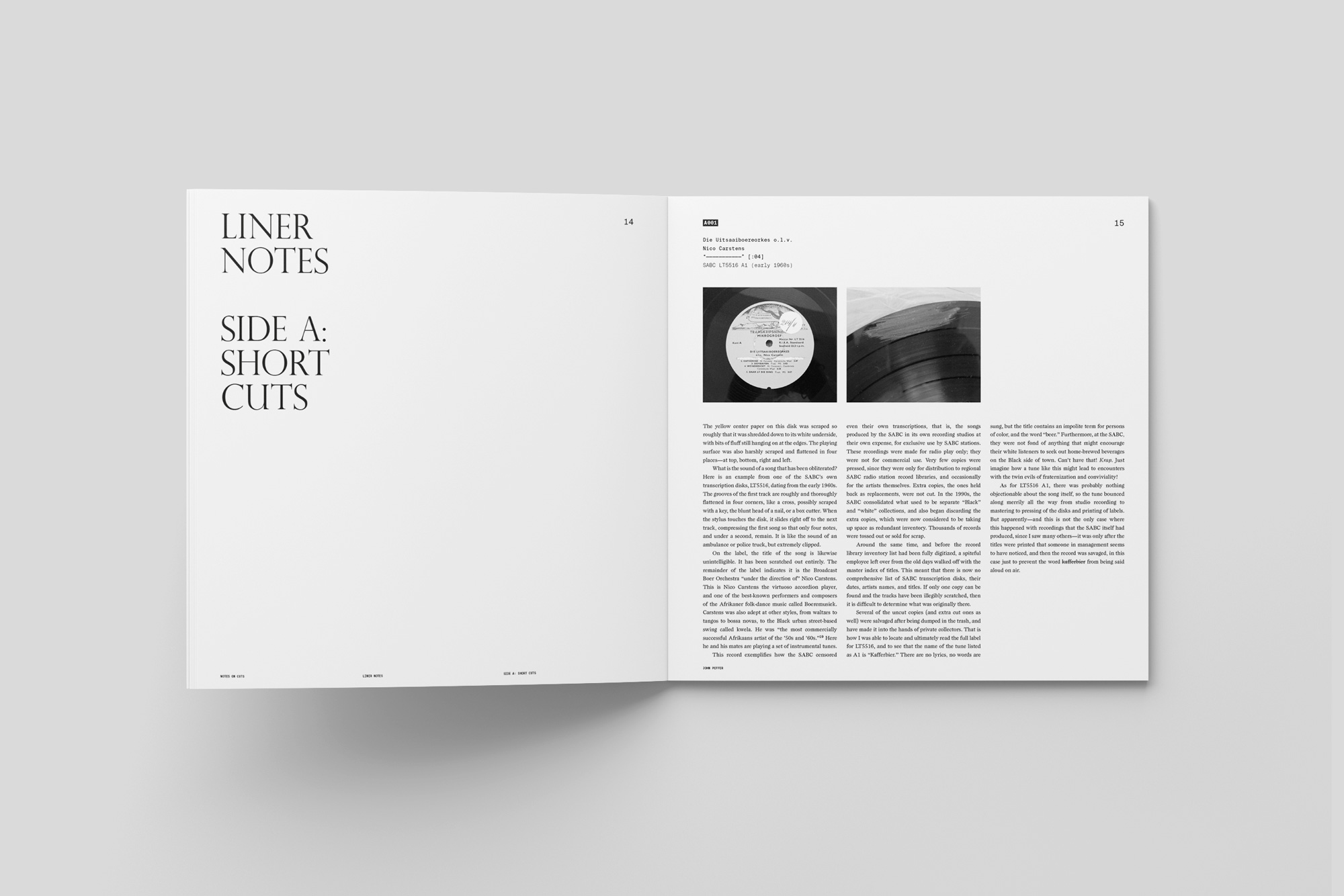




Artist: John Peffer
Title: Notes on Cuts
Date: 2023
Cat no. NTC003
Genre: Sound Art
Edition: 250
Price: 80 USD
︎︎︎ For purchases, email bhavisha.panchia@gmail.com
12" Standard Weight Black Vinyl Record
Side A, endless loop
Labels - (B&W) - white OFFSET/uncoated stock
12" Vinyl Jacket - 350gsm Board w/6mm Spine
Reverse Side Printing
12" LP Booklet: 48pp - 4/4 - 120 GSM Offset - Thread Bound
b/w and colour reproductions
Copy Editing: Tracy Murinik
Design: Gabrielle Guy
Language : English
Nothing to Commit Records presents Notes on Cuts, a vinyl record+book project that researches the complexity of music censorship in South Africa during apartheid by exploring records that were physically cut by state broadcasters to prevent them from being heard. Notes on Cuts delves into the histories of listening by directly confronting their censored and controlled forms. The censors' scratches and cuts are held up for visual analysis, and then listened to, in order to find what secrets they may reveal. These are literal scars into the black plastic that hold the sounds and notes of songs meant to be enjoyed, celebrated, and danced to, but once forbidden.
Written and recorded by art historian and scholar John Peffer, the project offers creative and critical understandings into the history of South Africa’s radio broadcast services, and listens closely to the bureaucracy of censorship under the apartheid regime. Peffer’s reflective notes provide insight into governmental decisions to censure as a means of control by a close looking and listening to a selection of songs and albums.
Written and recorded by art historian and scholar John Peffer, the project offers creative and critical understandings into the history of South Africa’s radio broadcast services, and listens closely to the bureaucracy of censorship under the apartheid regime. Peffer’s reflective notes provide insight into governmental decisions to censure as a means of control by a close looking and listening to a selection of songs and albums.


From the author [excerpt from the book]:
First, I had to submerge myself in the dust of this huge propaganda bureaucracy.
Then, I wanted to attempt to understand it against itself, in some kind of more fully
visceral or sensorial way. I wanted to use my senses against the censor, to exorcise
the cuts by holding them close, rubbing up against them, and feeling their contours.
In response I wanted to get under the skin of this archive, to do more than recite the
numbers and the institutional history, and find a way to have these silenced surfaces
speak again. Unlike most earlier researchers I was able to spend significant time
handling and examining the vinyl disks. I came to consider them as archives of
inscriptions, as worthy of consideration as a collection of paper records.
After looking at thousands it became apparent to me that, along with the variable
"why" of it, there was also not much consistency in terms of "how" particular
crossing-out marks were made. What initially had seemed to me to be a monolithic
and highly controlled enterprise appeared on closer inspection to have played out in
an ad-hoc, or sometimes even sloppy manner.
Some say "Krap" (scratch), others "Nie goed nie" (no good), others "afgekeur"
(declined), or "banned". Still others were marked "Avoid," "not available,"
"restricted," or "not suitable" / nie geskik nie. Yes, even those transcription disks paid
for by SABC, recorded in SABC studios by in some cases the SABC's own orchestras,
and pressed and packed at the SABC record factory. These, too, fell under the scribbly
pen and the knife.
Track List:
Notes on Cuts is a sonic archive of the sounds of damage done to vinyl records
by censors at the South African Broadcasting Corporation (SABC) during apartheid. The
titles below refer to songs that were cut by the censors.
SIDE A
A001 Die Uitsaaiboereorkes o.l.v. Nico Carstens, “----------” (early 1960s)[:04]
A002 Dick Charles Mokgoko, “Ke Tshwana Le Mang (Why are you different?)” (ca. 1970)[:06]
A003 Jim Reeves, “Auf Wiederseh’n Sweeheart” (1963)[:21]
A004 Fani Pfumo and his L.M. Band, “Nwanyana Wanga” (ca. 1970)[:23]
A005 S. Ngubane Piliso (Shadrack Piliso), “Aiyee!” (1964)[:30]
A006 Tau ea Linare, “Motau” (1981)[:43]
A007 Frans Mokoena, “Dijo tsa mmusho” (late 1970s)[:43]
A008 The Naughty Boys, “C. to C.” (1976)[:43]A009 Jim Reeves, “The Old Kalahari” (1963)[:48]
A010 Bra Joe, “Bethela Nzimande” (1976)[1:03]
A011 Bob Marley and the Wailers, “Easy Skanking” (1983)[1:25]
A012 The Wilba Music Group, “Uma Ngificwa Ukufa” (1981)[1:35]
A013 Nico Carstens En Sy Orkes, “----------” (early 1960s)[1:52]
A014 The Dorsey Brothers Orchestra, “Basin Street Blues” (1958)[1:55]
A015 The Elite Swingsters, “Bophelong” (ca. 1961)[2:40]
A016 The Wilba Music Group, “Kuyo Loo-Ntolongo” (1981)[1:12]
SIDE B
B001 The Movers, “Introduction” [3:13](1975)
B002 Oscar Peterson Trio, “Misty” [3:36](1965)
B003 Electric Light Orchestra, “One Summer Dream” (1978)[5:10]
B004 Assagai, “La La” and “Bayeza” (1972)[6:35]
John Peffer is a specialist in modern African art and photography, the author of Art and the End of Apartheid (2009) and co-editor of Photography and Portraiture in Africa (2013). His research has examined the historiography of African Art History, art and visual culture in South Africa during apartheid, and general issues of global modernity and human rights in art, photography, and visuality.
